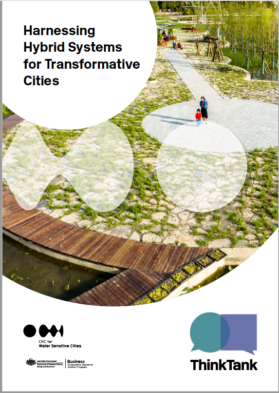Harnessing hybrid systems for transformative cities
Water sensitive cities principles are evident across Australia and globally. Working with partners, the Cooperative Research Centre for Water Sensitive Cities (CRCWSC) operationalised water sensitive practice at a range of scales. For example, we have demonstrated: (i) proofs-of-concept for new technologies and urban designs, applied in pilot-scale and development-scale works on-ground; (ii) a methodology for determining the ‘optimum portfolio of water supply options’, based on Greater Melbourne; (iii) a procedure for valuing non-market economic benefits of water sensitive practices; and (iv) water policy reforms in local and state governments that reflect research insights and outputs.
But, we know there is more to do. We need to keep building and refining the institutions, regulations, technical tools and industry networks necessary to scale up and lock in water sensitive practices. To continue this transformation, the CRCWSC embarked on a 'deep dive' to understand how we can enable this next wave of interdisciplinary research-to-practice innovation translation.
Our imagined transformative cities step up the use of hybrid systems, by progressively combining critical existing infrastructure with flexible decentralised local solutions as part of their urban renewal program. This new thought piece from the CRCWSC sets out the agenda for transformative cities in the hope it provides a framework and direction for collective research and action.
The paper incorporates the views of experts from the CRCWSC, Monash Sustainable Development Institute, Aurecon, Marsden Jacob Associates and RMIT University. We thank them for their time and considered views about ways to continue the transformation to water sensitive cities.
